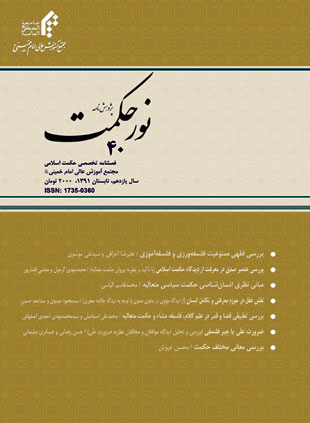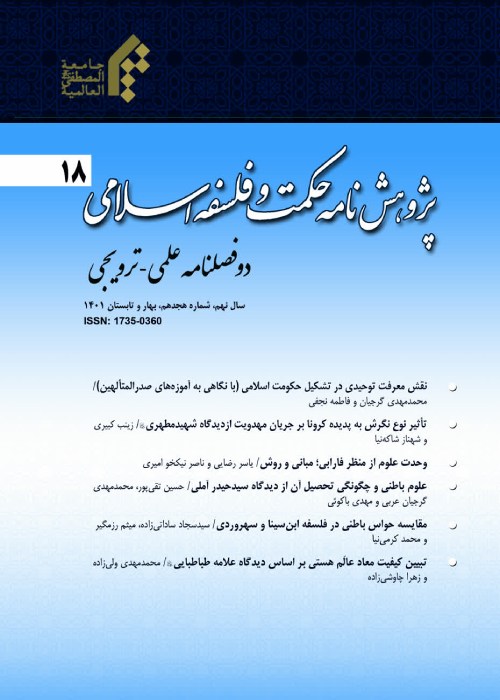فهرست مطالب

پژوهشنامه حکمت و فلسفه اسلامی
سال یازدهم شماره 40 (تابستان 1391)
- بهای روی جلد: 20,000ريال
- تاریخ انتشار: 1392/04/15
- تعداد عناوین: 7
-
صفحه 165
-
Page 5Philosophical enterprise has aroused opposition sometimes in terms of excommunications and banning. The present article attempts to study legal prohibition or undesirability of practicing as well as learning philosophy. On this matter four legal topics and two hadiths are examined as arguments for canonical undesirability of philosophy. These topics are: prohibition of doing pointless works, prohibition of practicing any useless science, prohibition of misguiding sciences and prohibition of taking knowledge from any source other than the Family of the Prophet. None of these alleged arguments can clearly show the universal and perpetual prohibition or undesirability of philosophy.Keywords: fiqh, hadiths, Practicing, learning Philosophy
-
Page 31Definition of knowledge is one the most important problems in epistemology which itself gives rise to much debate and stances taken by opponents and proponents. Truth as the most significant and frequently used elements of knowledge is common to most of definitions of knowledge. The element ‘truth’ is seen in the definitions Muslim philosophers as well as westernepistemologists present for knowledge. In their definitions they draw attentions to the analysis of“truth”. By presenting adequate analysis for truth, Islamic philosophers put an end to the controversies by their giving due explanation to the problem of knowledge. This article deals with truth and its various analysesfrom Islamic philosophers particularly the advocates of transcendent philosophy.Keywords: presential knowledge, discursive knowledge, mental, extra, mental, thingin, itself, criterion of truth, primary self, evident propositions
-
Page 55This article is an attempt to answer the question as to the philosophical principles and foundations as well as methods of humanology of transcendent political philosophy. In order to obtain the proper answer, one should discuss first the relation between the humanology with basic method and then its relation with transcendent political philosophy. In the first part of this essay we face a variety of principles: substantial motion, free will of human being, the unity of intelligent, intelligible and act of intellection, man as a being of social nature, cosmic caliphate of perfect man, true felicity and perfection of human beings and finally especial understanding of man as one who is corporeally generated and spiritually persists. On the basis of these principles the socio-political life of man is defined and guaranteed in terms of his happiness in both this world and hereafter. The concepts of self-respect, good management, justice, freedom, wisdom, sovereignty, authority and legitimacy can be properly defined when one has an appropriate understanding of the nature, perfection, felicity and edification of human being. These foundations and related epistemic dimensions can transform the society and turn it into a locus for the manifestation of God.Keywords: wisdom, transcendent theosophy, transcendent political philosophy, humanological principles of transcendent political philosophy
-
Page 83Exploration of reason in the domain of knowledge in general and from the perspective of Rumi and Allama Jafari in particular is important in that reason is considered as means of guidance and "inner messenger" of human being that leads him to the faith in and nearness to God, the ultimate object of his devotion. Nonetheless reason is not able to provide a complete plan of guidance for mankind and in this regard is in need of direction and guidance by the Messengers of God to attain its perfection. Man who has followed the way of perfection and salvation by the use of reason and insight attains the beauties and enjoys the absolute Beauty that is the ground of all instances of beauties through His pre-eternal wisdom. Such a man will regard any devotion to other than God as an expression of polytheism. Rumi and Allam Jafari, among others, maintain that reason can attain the true knowledge under the direction of prophets of God. In this way it will be able recognize goods and beauties as manifestations of and indeed identical to the Beauty of God. Praise of any beauty, therefore, will be praise of God, for He has revealed His Beauty to the world.Keywords: Jalaluddin Rumi, Allama Jafari, reason, Mathnawi knowledge, perfection, human being
-
Page 107The problem of Divine Decree and Preordination which was raised among the Islamic thinkers from the very beginning has been variously interpreted in the course of history. Shiʿite and Muʿtazilite theologians interpreted the Divine Decree (qaḍa) only in the context of human actions in terms of God’s commanding the acts of obedience and forbidding those of disobedience or as informing and declaring His wills to mankind. Ashʿarites on the other hands, explain the Divine Decree and Preordination as His act of creation and direct act of giving existence to all creatures including so-called free acts of human beings. Muslim Peripatetic philosophers, however, have another interpretation for Divine Decree, explaining it as stage of Divine Knowledge. They maintain that Divine Decree is the same as knowledge-form and original existence of all beings in the “Intellectual World” and the Preordination in terms of particular mental existence of all beings and events imprinted on imagination faculty or natural soul of heavenly sphere. Entified preordination is identified as material forms found in nature. Like his predecessors Mulla Sadra regarded Divine Decree and Preordination as two stages of God’s Knowledge but he does not take it as representational and imprinted acts of knowledge. Allama Tabatabae’s view on Divine Decree and Preordination is more comprehensive.Keywords: Divine Decree, Divine Preordination, Shiʿite, Muʿtazilite, Ashʿarites, Intellectual World
-
Page 139The relation of free will and causal necessity is one of the controversial problems in philosophy which from the start gave rise to much debate among Islamic thinkers. Well-known theologians believe that cause can never necessitate its effect at least in the case of free agent's acts of will on the ground that the free will of God and that of human being is incompatible with causal necessity. Most of Muslim philosophers however, hold such necessity to be self-evident according to which the existence of effect is inevitably necessitated by presence of complete cause. This article is an attempt to reformulating the arguments of proponents of causal necessity along with the detailed view of some Shiite contemporary scholars in philosophy and principles of fiqh.Keywords: causation, causal necessity, preponderance without preponderant, antecedent necessity, consequent necessity, necessity, by, another, necessity by comparison
-
Page 165Wisdom is used in two meanings: literal and technical. The latter indicates philosophy and is applied in two limited and non-limited ways. Philosophers define wisdom in terms of subject-matter, problems and aim for it. Mulla Sadra for instance defines wisdom in a general way that includes both theoretical and practical wisdoms. Ibn Sina considers wisdom to be the perfection of the human soul. Philosopher Sabzavari describes wisdom as means by which man can be drastically changed into real realm corresponding to the external world. IbnArabi regards wisdom to be judgment on the existence and essence of things out of realization without any imitation. This article has a critical review on the viewpoints of these prominent philosophers on the definition, subject-matter and aim of wisdom as field of study.Keywords: Wisdom, philosopher, Mulla Sadra. Ibn Sina, Sabzavari the theosopher, Ibn Arabi


